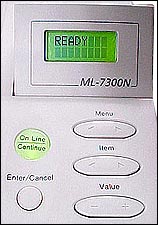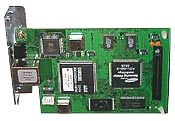Printer Controls:
 The power button is located on the lower front of the printer and easy to reach should the ML-7300N be shoved into a corner, as printers normally are.
The power button is located on the lower front of the printer and easy to reach should the ML-7300N be shoved into a corner, as printers normally are.
Aside from
the relatively simple control panel on the top of the printer, the only other indicator on the printer is the paper level window. A small purple slider shows you how much paper is left in the tray, should you feel the need to refill.
The printer
controls are dead simple the small back lit LCD screen is easy to
navigate with a bit of practice, and help from the manual. There are only two rows of eight characters so menus are broken down into their most basic components.
The
Enter/Cancel button is used to cancel print jobs and lock in
changes when the unit is being configured. The Menu button brings up the
internal configuration screen, which is navigationally
by the Item and Value keys. The Online key makes the printer ready to print, or
takes it down for configuration.
Add-on Components:
| Network Card (standard) |
|

|
| SIMM Memory Expansion (X2) |
 |
Upgradability is taken care up by means of a removeable panel on the side of the printer which is configured
to accept extra memory, and in the case of the pure ML-7300 model, the Ethernet expansion card (this is standard on our test model however, the ML-7300N).
Up next, print speed tests and printer quality evaluation.
Testing the ML-7300N for
print speed under various document
loads
When we consider how fast a printer works it is important
to remember a few things. First of all, the speeds which are
listed by the manufacturer are generally the fastest possible speed - something
that traditionally has occurred when printing plain text
pages only. When we as users throw images into the mix, or Acrobat PDF's, things
can sometimes begin to slow down, especially if the printer is
without a large memory buffer.
Therefore, when we test out printers,
we look at not only their ability to quickly print out pages of raw text, but
also solid pages of images and PDF documents. In these tests, the
printer in question, the Samsung ML-7300N, is connected via the network to a
computer running Windows 2000. The only caveat is the time it takes to transfer
the print file over the network, which can be a bit long if
it is large, or set to 1200dpi.
| 600dpi Time Tests: Pages Per Minute (PPM) |
| Printer |
Raw Text |
PSD Image |
PDF File |
| ML-7300N |
21 ppm |
21 ppm |
21 ppm |
| File Size |
127KB |
2.4MB |
842KB |
| 1200dpi Time Tests: Pages Per Minute (PPM) |
| Printer |
Raw Text |
PSD Image |
PDF File |
| ML-7300N |
21 ppm |
21 ppm |
21 ppm |
| File Size |
127KB |
2.4MB |
842KB |
Of the Samsung printers we have reviewed so far, we
have been quite surprised to see the listed print speeds matched. The ML-7300N printed
pages from the following tests steadfastly at 21 pages a minute according to our
stopwatch. Upping the resolution to 1200dpi showed no slowdown in any of the
test printings.
Printer Test Patterns
The next set of tests revolve around ZDnets set of
printer test patterns. Since we are looking at a mono Laser printer we will only
be using two of the three tests. Those of you who would like to test out your
current printers can go here to download the test patterns. The patterns are
supplied as Adobe Illustrator, Adobe Acrobat and Jpeg images. Ideally the .AI
patterns should be used, but if you don't have the software the .pdf files offer
a good alternative. The jpeg image should be avoided where possible as none of
the patterns are vectors so if offers the least resolution of the three.
The test patterns are grouped into two sets, the first
measuring gradients and resolution, and the second letter quality at different
font sizes.
Gradient Test Pattern: The test pattern
is encompasses both a vertical and horizontal gradient, which ideally should
move smoothly from black to white with no visible banding or jarring. At
600dpi the horizontal gradient is very smooth with only the slightest hint
of banding in one or two places, while 1200dpi is a bit more raw. The vertical
gradient is also quite good at 600dpi, but banded into about five segments when
the resolution is upped to 1200dpi.
Line, and Angled Lines Test Pattern:
The solid horizontal lines at both 600 and 1200dpi are
perfect, while the angled lines are only completely replicated at 600dpi. The
1200dpi large angled lines are good, but the smaller angled lines have darker 7
line by the looks of it.
Bezier Curves and Radial Fills: If you happen to test your own printer out, be sure to note the
differences in quality between the Acrobat and Illustrator files.
In particular the curves and radial fills will look substantially sub-par when output through the
acrobat program. Illustrator works with vectors and the reproduction is much more
true. The spirals are very well printed, with only scant instances
of blotching visible at 600dpi. The curved lines appear smooth and uniform
in width illustrating good print quality. The radial fills are best at
600dpi, and take upon a stepped appearance when the print quality is upped.
Font Size Test Pattern
The type test pattern
has one sentence, "The quick brown fox jumped over the lazy dog" written in
sizes ranging from 48-point to 4-point. In all cases the text is clearly legible, even
at the smallest size, but the upward strokes disappear on some letters (like "v").
